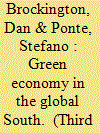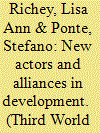|
|
|
Sort Order |
|
|
|
Items / Page
|
|
|
|
|
|
|
| Srl | Item |
| 1 |
ID:
082012


|
|
|
|
|
| Publication |
2008.
|
| Summary/Abstract |
Bono's launch of Product (red)™ at Davos in 2006 opens a new frontier for development aid. With the engagement of companies such as American Express, Converse, Gap and Emporio Armani, and now Hallmark, Dell and Microsoft, consumers can help hiv/aids patients in Africa. Aid celebrities-Bono, Jeffrey Sachs and Paul Farmer-guarantee the 'cool quotient', the management and the target of this new modality of aid. red functions using the guarantee of celebrity together with the negotiated representation of a distant 'Africa' to meet competing, and perhaps incommensurable, objectives. A 'rock man's burden'-imagined along familiar constructions of sex, gender, race and place-frames African beneficiaries' receiving process. At the same time, red depicts consumer-citizens as fashion-conscious yet actively engaged and ethically reflexive. red rescues international aid from its dour predictive graphs and disappointing 'lessons learnt' and spins it as young, chic and possible. By masking the social and environmental relations of trade and production that underpin poverty, inequality and disease, red reconfigures the world of possibility in what might otherwise be rationally impossible ways.
|
|
|
|
|
|
|
|
|
|
|
|
|
|
|
|
| 2 |
ID:
086012


|
|
|
|
|
| Publication |
2009.
|
| Summary/Abstract |
The Product (RED) initiative was launched by Bono at Davos in 2006. Product RED is 'a brand created to raise awareness and money for the Global Fund to Fight AIDS, Tuberculosis and Malaria by teaming up with iconic brands to produce RED-branded products'. With the engagement of American Express, Apple, Converse, Gap, Emporio Armani, Hallmark and Motorola, consumers can help HIV/AIDS patients in Africa. They can do so simply by shopping, as a percentage of profits from Product (RED) lines goes to support the Global Fund. In this article we examine how the corporations that are part of this initiative use RED to build up their brand profiles, sell products and/or portray themselves as both 'caring' and 'cool'. We also show that, more than simply being another example of cause-related marketing (like the pink ribbon campaign or the ubiquitous plastic armbands), RED engages corporations in profitable 'helping' while simultaneously pushing the agenda of corporate social responsibility (CSR) towards solving the problems of 'distant others'
|
|
|
|
|
|
|
|
|
|
|
|
|
|
|
|
| 3 |
ID:
128463


|
|
|
|
|
| Publication |
2014.
|
| Summary/Abstract |
Consumers, partnering with corporations and celebrities, are forming new alliances in international development through what we call 'Brand Aid' initiatives. At a time of shifting relationships between public and private aid, commodities are sold as the means of achieving development for recipients and good feelings for consumers simultaneously. In this article we first formalise our conceptual model of Brand Aid at the triple interface of causes, branded products and celebrities. Then we conduct a systematic empirical analysis of contemporary Brand Aid initiatives, including three in-depth case studies of 'Win One Give One', toms shoes and Product (red). We argue that these not only use imaginaries of development to sell products to Northern consumers but also engage in the work of a 'story factory' - producing truths about international development and consumer engagement that make development appear simplified, manageable and marketable. We conclude that, in Brand Aid, the problems themselves and the people who experience them are branded and marketed to Western consumers (through celebritised multimedia story-telling) just as effectively as the products that will 'save' them.
|
|
|
|
|
|
|
|
|
|
|
|
|
|
|
|
| 4 |
ID:
078568


|
|
|
|
|
| Publication |
2007.
|
| Summary/Abstract |
Black Economic Empowerment (BEE) is an attempt to marry redistributive and neo-liberal economic policies. The South African state, however, has differing degrees of power to force redistribution on different sectors of the economy. Fisheries is one of the sectors where state allocation of licenses, exploitation rights and quotas makes the prospects for BEE promising. In this article, we examine redistributive processes in the hake trawl industry. We conclude that BEE, despite its redistributive intentions, has been doubly conducive to the interests of large-scale South African capital. To begin with, it has by and large confirmed the historical share of fishing rights to incumbent, largely white-controlled, operators. Second, it has created a layer of 'black captains of industry' to whom incumbents are increasingly outsourcing primary production in a volatile, high-risk and currently loss-leading sector. While fishing operations are being outsourced under the banner of redistribution, the fish trade remains under the effective control of white capital.
|
|
|
|
|
|
|
|
|
|
|
|
|
|
|
|
| 5 |
ID:
172578


|
|
|
|
|
| Summary/Abstract |
This article analyses the patterns of poverty, prosperity, and rural transformation in Tanzania through longitudinal research examining livelihoods and asset change in a 20-year period. We argue that some current measures of rural transformation are inadequate for capturing forms of change that matter to rural Africans. We consider in detail some of the processes that lie behind such change in selected locations in Morogoro region, noting the importance of improvements that are taking place through smallholder agriculture. In conclusion, the article discusses the implications of these findings for agricultural policy while also cautioning about the blindness of our methods to other forms of poverty.
|
|
|
|
|
|
|
|
|
|
|
|
|
|
|
|
| 6 |
ID:
142654


|
|
|
|
|
| Summary/Abstract |
As multiple visions for a Green Economy seek to become real, so are green economic initiatives in the global South multiplying. These can offer integration into wealth-generating markets – as well as displacement, alienation, conflict and opportunities for ‘green washing’. The articles included in this collection bring together a multidisciplinary team of scholars and a range of case studies, from forestry governance to tourism to carbon finance, to provide nuanced analyses of Green Economy experiences in the global South – examining the opportunities they provide, the redistributions they entail and the kinds of resistance they face.
|
|
|
|
|
|
|
|
|
|
|
|
|
|
|
|
| 7 |
ID:
128460


|
|
|
|
|
| Publication |
2014.
|
| Summary/Abstract |
New actors and alliances in development' brings together an interdisciplinary group of scholars exploring how development financing and interventions are being shaped by a wider and more complex platform of actors than usually considered in the existing literature. The contributors also trace a changing set of key relations and alliances in development - those between business and consumers; ngos and celebrities; philanthropic organisations and the state; diaspora groups and transnational advocacy networks; ruling elites and productive capitalists; and 'new donors' and developing country governments. Despite the diversity of these actors and alliances, several commonalities arise: they are often based on hybrid transnationalism and diffuse notions of development responsibility; rather than being new per se, they are newly being studied as practices that are now coming to be understood as 'development'; and they are limited in their ability to act as agents of development by their lack of accountability or pro-poor commitment. The articles in this collection point to images and representations as increasingly important in development 'branding' and suggest fruitful new ground for critical development studies.
|
|
|
|
|
|
|
|
|
|
|
|
|
|
|
|
| 8 |
ID:
057617


|
|
|
|
|
|
|
|